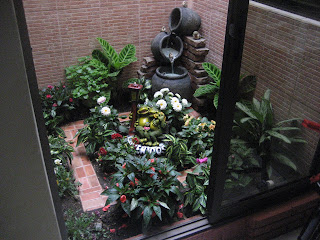So... Marco (my host brother, the smooth Tico pilot) and I ran some errands on Friday. While we were in Alajuela I had him show me where he gets his hair done. The place was incredible. It’s a barber shop the size of a soccer goal, run by one old barber who exudes a sense of experience and authenticity. There was a sign (made of paper) stating the price per haircut. Fourteen hundred Colones. The conversion is 515 Colones to the dollar; that’s less than three dollars!
I simply sat down and told the barber that I wanted to be Puro Tico, or as they say here in Costa Rica, “Mas Tico que Galla Pinto.” Roughly translated, that means more Costa Rican than beans and rice. I ended up getting a nice clean haircut, with some volume left on the top to gel like a Latino. And it worked. I’ve had multiple Ticos ask me directions already.
I’ve attached some pictures of me hanging around the house with my host family. One of the photos is of Marco, Marta (my mom-away-from-mom), and Tami, an extremely annoying and prissy house dog that we’re watching for the next few days.
Today (Saturday) was the most beautiful day so far in San Jose. It was sunny, breezy, and just the perfect day to sightsee. Our little group explored San Jose together, and then went on a tour of the national museum of Costa Rica. Only three of us decided to take advantage of this optional experienced offered through the Center For Teacher Development (CTFD), making the experience very personal.
I found the diverse ethnic origin of Costa Rica fascinating, as well as Las Esferas (the spheres). These giant balls made of volcanic rock really stand out against nature. While a sphere is a very organic shape, there is nothing natural about a chiseled volcanic ball sitting in a field. Many anthropologists have attempted to explain these forms. Some claim that they were likely used to mark property boundaries, others claim that they’re astrological interpretations. The more extreme explanations of these balls suggest extraterrestrial influence. Feel free to check out more about these balls [HERE].
Tonight was pretty calm. I visited a new friend down the street and talked health care and language learning. Surprisingly, I’m exhausted. That seems to be a regular thing for me; I’m becoming an old soul. I rarely stay up long enough to eat dinner. I’m happy though. At least I will be when I find a volunteer position in the community…
Pura Vida,
Z
























